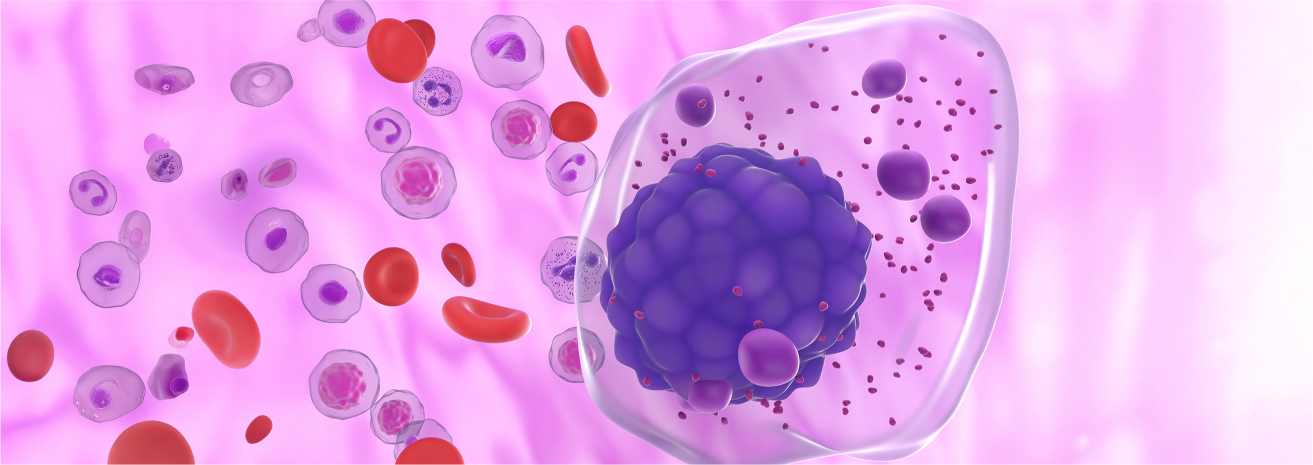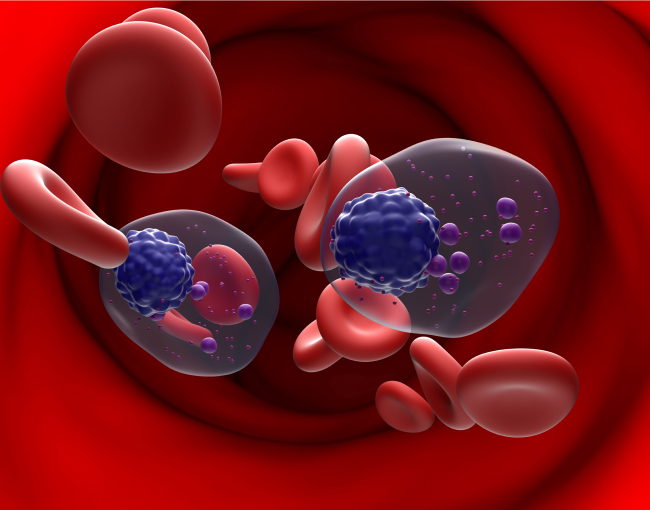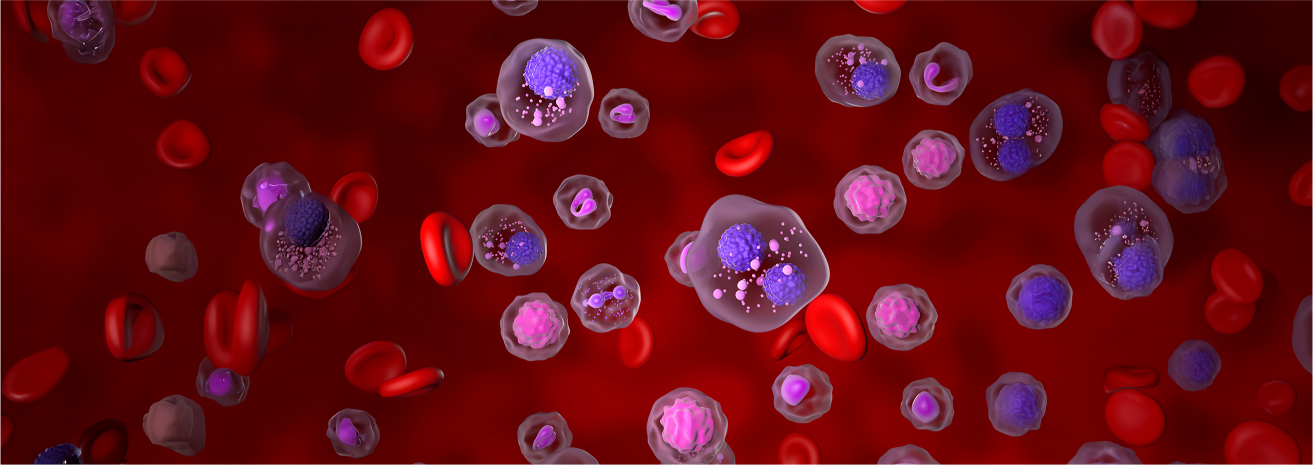Multiple Myeloma Cancer

Multiple myeloma is a type of blood cancer that affects plasma cells, a type of white blood cell found in the bone marrow. These abnormal plasma cells multiply and produce harmful proteins that can damage organs, weaken bones, and impair the immune system. While multiple myeloma is typically a chronic condition, advances in treatment have greatly improved outcomes for patients. At Burjeel Cancer Institute, we offer a comprehensive approach to multiple myeloma care, including chemotherapy, targeted therapy, immunotherapy, stem cell transplantation, and supportive care services.
Symptoms and Risk Factors
- Bone pain, especially in the spine or ribs
- Frequent infections
- Anemia and fatigue
- Weakness or numbness in the legs
- Unexplained weight loss
- Excessive thirst or frequent urination (due to high calcium levels)
- Kidney problems
- Easy bruising or bleeding

Risk Factors for multiple myeloma include
Age
The risk of multiple myeloma increases with age, with most cases diagnosed in people over 60.
Gender
Men are more likely to develop multiple myeloma than women.
Family History
A family history of multiple myeloma or other blood cancers increases the risk.
Race
Multiple myeloma is more common in people of African descent
. Exposure to Radiation or Chemicals
Long-term exposure to radiation, certain chemicals, or heavy metals can increase the risk.
Monoclonal Gammopathy of Undetermined Significance (MGUS)
People with MGUS, a precursor condition, have an increased risk of developing multiple myeloma.
Diagnostic Procedures
Multiple myeloma is diagnosed through a combination of tests to evaluate the extent of disease and its effects on the body. At Burjeel Cancer Institute, we use.
Blood Test
To measure levels of calcium, creatinine, and proteins (including abnormal monoclonal proteins or M proteins) can help diagnose and monitor multiple myeloma.
Urine Tests
A 24-hour urine test may detect abnormal proteins (Bence-Jones proteins) that are produced by multiple myeloma cells.
Bone Marrow Biopsy
A sample of bone marrow is taken to confirm the diagnosis and identify abnormal plasma cells.
Imaging Tests
X-rays, CT scans, MRI, or PET-CT scans are used to detect bone lesions or other signs of myeloma.
Cytogenetic Testing
This test looks for chromosomal abnormalities in myeloma cells to classify the disease and guide treatment.

Treatment Options
Radiation Therapy
- Targeted Radiation Therapy: Radiation may be used to shrink bone tumors or relieve pain caused by multiple myeloma.
Stem Cell Transplantation
- Autologous Stem Cell Transplant: The patient’s own healthy stem cells are collected and re-infused after high-dose chemotherapy to rebuild the bone marrow. This is a common treatment for multiple myeloma.
- Allogeneic Stem Cell Transplant: Stem cells from a donor are infused into the patient to replace the damaged bone marrow, though this is less common due to risks associated with graft-versus-host disease.
Immunotherapy
- Monoclonal Antibodies: Drugs such as daratumumab target specific proteins on myeloma cells, marking them for destruction by the immune system.
- CAR T-Cell Therapy: In this type of immunotherapy, a patient’s T cells are engineered to target and destroy myeloma cells, used in certain relapsed or refractory cases.
Targeted Therapy
- Proteasome Inhibitors: Drugs like bortezomib and carfilzomib block the proteasome, a protein complex that myeloma cells rely on to survive.
- Immunomodulatory Drugs (IMiDs): Drugs like lenalidomide and thalidomide help boost the immune system and attack myeloma cells.
Chemotherapy
- Combination Chemotherapy: Multiple drugs are often used together to target and destroy myeloma cells, typically as the first line of treatment.
- High-Dose Chemotherapy: This is often used before a stem cell transplant to kill as many myeloma cells as possible.
Multidisciplinary Approach
Multiple myeloma care requires a coordinated effort from various specialists. At Burjeel Cancer Institute, our team includes
- Hematologists
- Medical Oncologists
- Stem Cell Transplant Specialists
- Radiation Oncologists
- Immunotherapy Experts
- Radiologists
- Pathologists
- Oncology Nurses
- Palliative Care Specialists.
This team works together to provide a personalized treatment plan for each patient, tailored to the type and stage of their disease.


Supportive Care and Patient Services
We offer a range of supportive care services to help multiple myeloma patients manage their treatment and maintain their quality of life
Bone Health Management
Bisphosphonates or other treatments are used to protect bones and prevent fractures.
Infection Prevention and Management
Due to the weakened immune system caused by multiple myeloma and its treatments, we provide measures and treatments to prevent and manage infections.
Kidney Function Monitoring
Myeloma-related kidney issues are monitored and treated to prevent further damage.
Palliative Care
Symptom management and quality-of-life support for patients with advanced or relapsed multiple myeloma.
Psychosocial Support
Counseling services to help patients and their families cope with the emotional and psychological challenges of a multiple myeloma diagnosis.
Physical Rehabilitation:
Programs to help patients regain strength and improve mobility after treatment.
Nutritional Counseling:
Tailored dietary advice to help patients maintain strength and manage side effects during chemotherapy or stem cell transplantation.
Patient Journey
We guide multiple myeloma patients through every step of their treatment journey, ensuring personalized care and support.
Initial Consultation:
A comprehensive evaluation with the multiple myeloma care team, including diagnostic tests to assess the extent of the disease.
Personalized Treatment Plan:
Based on the patient’s diagnosis, preferences, and overall health, a customized treatment plan is developed.
Treatment and Support
Patients undergo chemotherapy, targeted therapy, immunotherapy, or stem cell transplantation as part of their treatment plan, supported by a multidisciplinary team.
Follow-Up Care
After treatment, patients receive regular follow-ups to monitor their recovery, assess treatment response, and manage long-term health concerns.












